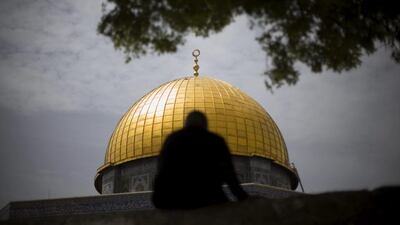Israel’s new mayor of Jerusalem is planning to push for the volume to be turned down on the city’s mosque loudspeakers during the call to prayer.
Israeli television reports indicated that the move would be one of the first policy pushes by Moshe Lion after he won the municipal election in November, replacing hard-right mayor Nir Barkat.
“Our goal is to deal with this issue with all the relevant parties so that all those involved will be content,” Mr Lion said, according to the Hadashot TV report.
The initiative will reportedly see Jerusalem’s mosque loudspeakers replaces with new ones that broadcast at a lower volume. Police will be allowed to reduce the volume of the speakers in they are deemed to be too loud.
The move to muffle mosque loudspeakers, or muezzins, has long been mooted by Israeli lawmakers but Palestinians say the attempts are racist and a bid to diminish Arab influence in occupied Jerusalem, the city they hope will one day serve as the capital of any future state.
Around 20 per cent of Israel’s population is Arab and they say such volume control impinges on their religious freedoms.
Mosque loudspeakers broadcast five times a day and begin before dawn. Israeli right-wing lawmakers have long argued that such broadcasts are an annoyance to Israel’s Jewish population and say it wakes them up in the middle of the night.
_______________
Read more:
Jair Bolsonaro takes office in Brazil, says nation 'liberated from socialism'
US seeks to condemn Hamas by name in landmark UN resolution
The twin strategies of violence crippling Gaza
UN to vote on US measure condemning Hamas
_______________
Israeli legislation known as the “Muezzin Bill” has stalled since it was preliminarily approved by Israeli lawmakers in March 2017. It faced initial challenges being passed because ultra-religious Jewish lawmakers feared that it would prevent sirens being heard in majority Jewish towns and cities in Israel to mark the Shabbat, the weekly Jewish holiday that begins on a Friday and ends on a Saturday.
If passed, such legislation may allow for Israeli authorities to confiscate loudspeakers of mosques if they are deemed to be too loud. It would also outlaw calls to prayer from 11pm to 7am. Houses of worship will also be fined up to $2,700 if they violate the rules.
Jordan criticised the bill as “discriminatory” and a violation of international law, while Israeli Arab lawmakers said the bill would be a further source of tension. Leader of the Arab Joint List Ayman Odeh ripped up a copy of the bill’s legislation as it passed its first hurdle in the Israeli parliament in 2017. Israeli Prime Minister Benjamin Netanyahu has long supported the bill and is working for its implementation as Israeli law. Muslim leaders in Israel have pledged to continue playing the loudspeaker at the volume they want regardless of Israeli law.

